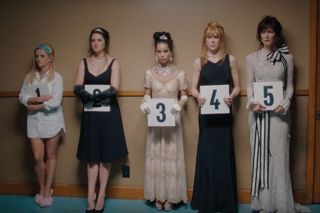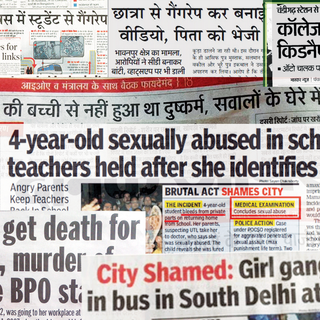
The Motherhood of ‘Big Little Lies’ Is Tedious, Devoid of Glory, and Totally Revolutionary
We never get to see such honest, varied versions of motherhood done justice in one TV show.

HBO’s now-extended mini-series, Big Little Lies, has been called a soap opera, perhaps because it follows five mothers around the idyllic beach town of Monterey, California, as they navigate their relationships and the complicated art of parenting. Soap operas are usually characterized by melodrama, an undue emphasis on romantic relationships, and are generally believed to be targeted at housewives. No offense to soap operas, but Big Little Lies, with its nuanced portrayals of sexual assault, marriage, and child-rearing, not to its mention goosebump-inducing performances, is anything but one. Most importantly, its depiction of motherhood, and the women who are constantly fighting to exist outside their identities as mothers, is revolutionary.
The first season of Big Little Lies explored violent domestic relationships, the mental health consequences of sexual assault, tumultuous marriages and adultery, all while interspersing such complex themes with the mundane acts of parenthood: school pick-ups and drop-offs, birthday party one-upmanship, and dealing with incompetent school staff. The plot builds to the murder of Celeste Wright’s (Nicole Kidman) abusive husband Perry Wright, played by Alexander Skarsgård, in a scene where the five leads converge, leaving the viewers with a sense of foreboding as to their future.
While the Perry-Celeste storyline, replete with violence and domestic abuse, is perhaps the most dramatically eventful one, the rest of the plot follows Jane Chapman (Shailene Woodley), who is dealing with the trauma from being raped; Madeline Mackenzie (Reese Witherspoon), who is reckoning with her extra-marital affair; Renata Klein (Laura Dern), who is vilified by the show’s other moms for wanting more than motherhood for herself; and Bonnie Carlson (Zoë Kravitz), who is dealing with a guilty conscience. Their kids go to the same elementary school, which allows the creators to root the show in the everyday routines of the five women, while they reckon with the ever-apparent fact that motherhood isn’t enough for them.
Related on The Swaddle:
‘Birdbox’ Shows Us a Version of Motherhood We Rarely Get to See
The most obvious examples are Celeste, played chillingly by Kidman, who gives up a thriving career as a lawyer for Perry, and endures abuse for the sake of her sons. In Celeste, we realize how far the inevitability of motherhood, and the absolute, all-consuming joy it supposedly brings, has been thrust into women’s psyche — that it has made being remotely dissatisfied with being a mother feel like a personal affront to the kids themselves. Big Little Lies shows it’s not; it glorifies parenting, but doesn’t pigeonhole motherhood.
While Celeste actively works to shield her sons from their father’s actions and memory, the newest addition to the show in season two, Celeste’s mother-in-law (Meryl Streep), is not letting it happen. Playing a fierce, protective mother, even of a dead son, Streep lends a disarming, almost terrifying softness, clad in venom, to her character. Yes, she’s a grieving mom who is looking for answers to her son’s sudden demise. But she also distrusts short people, is respectful of her daughter-in-law, Celeste’s, personal space, and loves to scream. Adding layers upon layers to its characters, even peripheral ones, is what Big Little Lies does best — an act that proves essential when it’s trying to destroy motherhood as a singular, absolute concept.
Renata Klein, played to perfection by Laura Dern, is perhaps the embodiment of the ‘not just a mother’ idea, as the character whom Madeline enviously calls the ‘career mommy.’ Renata boasts about being on the board of PayPal and makes multiple allusions to being the driving force behind tech MNCs; she’s constantly on the phone with an assistant, and is busy giving interviews to newspapers and posing for ‘Women in Power’ photoshoots. (“I’m so tired of those shots of women. I mean, they’re in power, right? They own banks, and they’re all, like, demure. Bullshit.”) She’s also steamrolling through her daughter’s school’s staff, berating them for not taking better care of her, coaxing them into paying special attention to the girl’s mental health and ability. In Renata, Big Little Lies flips the rhetoric of the fierce mother protecting her child on its head: Renata isn’t fierce because she’s a mother; she’s fierce and she’s a mother. She has a personality that exists outside of her maternal instincts, whatever that means, which often comes to her aid (and to others’ misfortune) when she chooses to wield it as a weapon in response to threats to her and hers.
Related on The Swaddle:
When Motherhood is a Trophy, Everyone Loses
Envious of Renata is Witherspoon’s Madeline, who, proudly and loudly, parks herself at the other end of the spectrum, as the ‘full-time mommy.’ She is constantly finding her self-worth in her kids’ abilities and decisions, and is battling disillusionment with her relationship and her ex’s supposedly happy re-marriage. Even in Madeline’s case, which holds up the stereotype of the mom — stay at home, devoted to kids, cooks healthy, elaborate meals — Big Little Lies manages to subvert mainstream depictions of motherhood. Madeline is constantly pestering her teenage daughter to go to college, make a life, and not end up like her. There are numerous movies and TV shows made from the perspective of the misunderstood teenager who resents their parent for the parent’s imposition of dreams. But Big Little Lies gives little screen time to Madeline’s daughter and her resentment, instead giving us a deeper insight into Madeline’s own dissatisfaction with her motherhood obsession. While teenagers are popularly glorified as the misunderstood group, mothers might just be the most misunderstood of all, and we’ll damn well know it, as long as Witherspoon (who is the executive producer of the show) has something to say about it.
It makes the viewer wonder: how are these characters, existing in a tight-knit sleepy town on the coast of California, able to hold in so much, be functional, loving and attentive, and display (sometimes-fraught) decision-making skills with a perpetual smile, or smirk, on their faces? It’s not the inherent strength of women, or some other tokenistic bullshit. It’s all of them, together; their relationships with each other are what carry them through. While the male characters in the show roil around in their own egos, and challenge each other to fistfights that never happen, the women are getting shit — by which, I mean everything — done. This is epitomized in Celeste’s relationship with Jane Chapman (Shailene Woodley), who was raped by the now-deceased Perry. Being mothers to children of the same man and recipients of abuse dealt by him, did not alienate the two characters, but brought them closer together in shared suffering. Be it running on the beach, seeking therapy, getting coffee or having hushed conversations in cars, reliance on and trust in each other carries them, even as they battle their individual demons.
Related on The Swaddle:
Modern Family: Motherhood is a Gray Area
Season two of Big Little Lies promises a deeper dive into motherhood, what with Meryl Streep’s already stellar performance (which Alexander Skarsgård says is only getting more elaborate) as her character goes hunting for answers. Zoë Kravitz’s Bonnie Carlson is only just getting an exploration three episodes into the new season, aided by the arrival of her blunt, abrasive mother who is not afraid to take men down a peg or two. “You just didn’t notice, did you? That’s your thing, isn’t it?” she says to her daughter’s husband, prompting incredulity from him. “Don’t get all sensitive with yourself,” she responds, sitting back, sipping wine, testing the waters. Season two alludes to a rocky relationship between Bonnie and her mother, another trope Big Little Lies excels at depicting: children are shaped by their moms, and they, in turn, have the power to influence their mothers’ lives. While we are constantly reminded of the former, we obliviously, and often on purpose, gloss over the latter.
So far, there’s only one problem with Big Little Lies: it might be that the show has too much substance — enough to critically blow the brains out of anybody paying attention.
Rajvi Desai is The Swaddle's Culture Editor. After graduating from NYU as a Journalism and Politics major, she covered breaking news and politics in New York City, and dabbled in design and entertainment journalism. Back in the homeland, she's interested in tackling beauty, sports, politics and human rights in her gender-focused writing, while also co-managing The Swaddle Team's podcast, Respectfully Disagree.
Related


News Reporting of Sexual Violence Is Propagating Rape Culture
